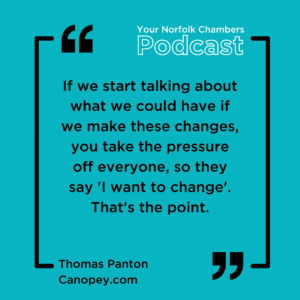Norfolk Chambers Podcast | with Joe Mills, Managing Director at the Tree Academy
We are pleased to welcome Joe Mills, Managing Director of The Tree Academy.
Joe has dedicated her career to understanding the elusive strands of what it means to be human; how we can lead more fulfilling lives, be better leaders, create environments people want to work in and run more successful businesses.
The Tree Academy brings together her belief in people’s ability to improve with her vast experience in the ‘people sphere’. Partnering people and organisations who need help establishing, enhancing and refocusing their approach, she creates uniquely practical solutions.
She describes her ability to see businesses as complete and single systems, much like a tree. “To design and ‘plant’ solutions with a life-time value, it’s critical for me to understand the ‘whole’ environment, how everything connects and responds. My mind quickly grasps and holds vast amounts of information, enabling me to distil and bring to life my clear and innovative plans. Solutions in isolation will only ever be temporary fixes and more damaging in the long-term”.
I also found out she enjoys ‘prescribing’ books as part of her coaching and mentoring approach. “As humans we connect to stories in a powerful way and at times I see someone’s need to shift their thinking with what I call my ‘sideways’ approach. As I read and listen to a huge amount of books, I have many to call on”!
Joe began making incredible videos during the height of the Covid Pandemic, which we shared and you can view on The Norfolk Knowledge Hub, as well as The Tree Academy’s new YouTube channel.
“My belief in people and their ability to improve themselves and their businesses drives me. It takes empathy, tenacity, skill, experience and a huge amount of my life. I wouldn’t have it any other way”.
You can contact Joe on Linkedin at https://www.linkedin.com/in/joemills1/ and at joe@joe-mills
Joe has recently become a Co.next Mentor – to find out more about Co.next, our programme supporting Norfolk’s under 35s and to get involved, click here










